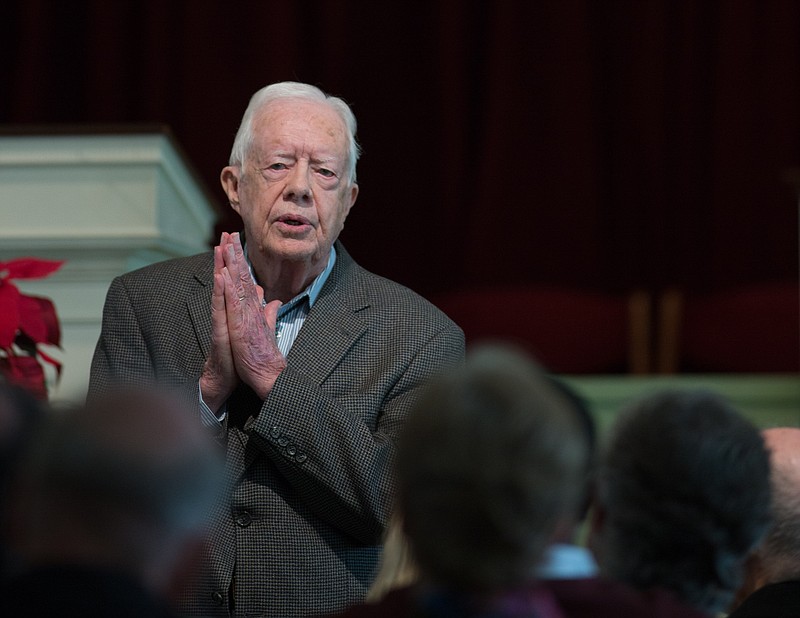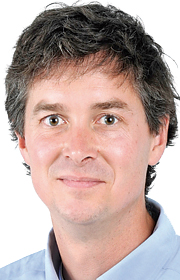In loud, irrational times like these, do you need a reminder of what a graceful statesman looks like? A politician who's humble and wise? A man you actually admire?
Then pack an overnight bag with your Sunday best and head south into Georgia, down two-lane highways and past cotton fields and boiled peanut stands. Stop when you reach a little town called Americus, near an even tinier town called Plains.
There, inside a small Baptist church, you'll find an American treasure.
President Jimmy Carter will teach Sunday school.
Earlier this year, my son and I made the trip. (Thanks, Hunter Huckabay, for the idea). We sat on the fourth pew of Maranatha Baptist while Carter taught for nearly an hour; it was like seeing the Grand Canyon, or some walking, talking national park.
"Is he, you know, in mint condition?" my son asked on the drive down.
Carter's 92 and seems 72. Recently, while building houses in Canada, he was hospitalized for dehydration. The next day, he was back hammering. He still teaches most Sundays in Plains, including most of August and all of September. (His Sunday schedule's online.)
If you want to see him, wake up early.
Our hotel alarm buzzed before 5 a.m.
A short drive from the hotel to Maranatha Baptist put us in the gravel church parking lot at 6:12.
We were the eighth car there.
The first car had arrived at 5:20.
"Last week, one fella got here at 3:45," said the parking lot attendant, a former rival peanut farmer to the Carters who now watches over parking every Sunday.
By 6:30, the parking lot had doubled with cars.
By 7:30, tripled.
View other columns by David Cook
We ate our hotel breakfast under the dome light in the car, then walked the grounds. The sun rose over old pecan trees. Men with earpieces walked German shepherds, who sniffed under cars, behind bushes. Kids played on homemade playground swings.
Folks came from Canada, California, Jamaica, Switzerland, Texas, Germany.
"I'm a missionary from the Congo," one woman said.
This small Georgia church had the whole world in its hands.
We like to think any man can become president, but Carter proves the reverse is true: The president can become an Anyman. In his later years, Carter could have resigned himself to the top floor of the Carter Center in Atlanta, but he's back in the place he grew up, preaching in a Sunday school church with a faded songbook on the organ and budget paper towels in the bathroom.
(I tire of the criticism that Carter's a good Christian but poor president. If that's true, then perhaps the White House isn't meant for Christians. Perhaps Christians cannot serve both brutish Washington politics and God.)
A little before 9, we lined up in order of parking lot arrival - remember: one fella got there at 3:45 a.m. - got wanded, searched, then ushered in. The sanctuary holds 100 or so; when it's full, folks are seated in a nearby fellowship hall where the service is streamed via TV.
Just before the 10 a.m. service began, former Sen. Sam Nunn, his daughter Michelle and their family walked in. Former first lady Rosalyn Carter followed. Then Linda Fuller, who founded Habitat for Humanity with her late husband, Millard.
Then President Carter.
He carried his black Bible and wore a turquoise bolo tie.
I've heard that when Rosa Parks walked into a crowded room the air changed, simply by her grand and storied presence. The same was true for Carter.
One woman began to weep.
For the next 50 minutes, he walked back and forth, telling stories, reading verses, preaching the gospel. He spoke about the walls between us - political, social, spiritual - and how our work is to tear those walls down. To love them down.
It was a bit dizzying; here was one of the most significant figures in modern U.S. history speaking with the grace, charm and wisdom of a grandfather or favorite teacher.
After Sunday school, there was a break before the 11 a.m. church service. (The Carters stay for that, then pictures.) We got up to stand in line for the church's lone bathroom.
Around the corner comes one Secret Service man.
Then another.
Then President Carter.
He looks at me, then down at my son.
"What's your name, young man?" the president asks.
My son tells him.
They shake hands and talk more, American to American. Carter looked and listened with sincerity, as if willing this sacred transfer of civic energy between him and a younger generation.
"I'm never washing this hand," my son whispered.
Here in America, we like to think the president reflects the people.
Or even the people reflect the president.
Down among the peanut fields of Georgia, you'll be reminded how that can be a good thing.
David Cook writes a Sunday column and can be reached at dcook@timesfreepress.com or 423-757-6329. Follow him on Facebook at DavidCookTFP.

